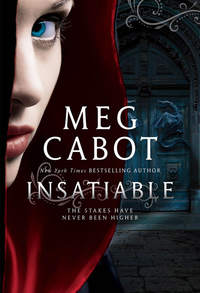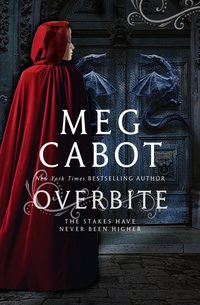
Полная версия
Insatiable
It was a man.
But he was a very tall man, dressed in a long black trench coat that flapped behind him almost like a cape.
Meena tightened her grip on Jack Bauer’s leash, and not just because the dog had begun growling. She was alone on a dark street approaching a large man she didn’t know. What on earth was he doing out at four in the morning without a dog if he wasn’t drunk?
She didn’t blame Jack Bauer for being suspicious. She was suspicious, too.
But as they approached the wide steps to St. George’s Cathedral, surrounded by scaffolding, Meena saw from the security lights shining down from the church spires that the man was unusually good looking—maybe in his mid to late thirties—and was in no way giving off signs that he didn’t belong in the ritzy neighborhood. His clothes were impeccably tailored and in good taste; his dark hair, brushed back from his temples without a hint of gray, immaculately groomed. Even his sideburns were the perfect length.
She was the one, she belatedly realized, who probably looked suspicious, given the fact that her short hair was doubtlessly pointing up in spikes (as it was wont to do when she’d just gotten up), she was without makeup, and her blue flannel pajama legs—with white puffy clouds on them—were sticking out of the bottom of her own trench coat, above her well-worn sneakers.
When she raised her gaze to meet his as he walked past her—Jack Bauer was practically snarling by this time—she was smiling apologetically, both for her appearance and for her dog’s behavior.
He smiled back, his eyes dark and as full of mystery as the windows peering down around them.
And she relaxed.
She had no bad feelings about this man. Not a single twinge about how or when he was going to die. Amazingly enough she felt nothing …
… nothing at all about him.
“Shhh,” Meena said to Jack Bauer, embarrassed over the dog’s antics.
It was right then that the sky collapsed.
Chapter Fifteen
4:00 A.M. EST, Wednesday, April 14
St. George’s Cathedral
180 East Seventy-eighth Street
New York, New York
The sky didn’t really collapse, of course.
It only seemed that way, because a huge section of it came swooping down at Meena from one of the spires of the cathedral.
She screamed and ducked, covering Jack Bauer with her body and arms, trying to protect them both from what looked like an ink-dark swath of material that came hurtling down at her head.
Except that she could see glimpses of the misty yellow glare from the street and security lights between the objects that were propelling themselves toward her at such an unbelievably fast speed.
Which was when Meena realized this wasn’t a single solid piece of St. George’s Cathedral, crumbling at last.
It was, unbelievably, bats. Hundreds, maybe thousands of black, shrieking bats, all headed straight at her, their pink mouths open, razor-sharp claws extended, beady yellow eyes bulging as they swept down from the cathedral’s spires, blocking out most of the night sky and available lamplight with their foot-wide wingspan, their only target Meena Harper and her Pomeranian-chow mix.
At first Meena froze. She wasn’t paralyzed with fear so much as with shock. All she could think was, this was how she was going to die? Being chewed to death by rats with wings?
Meena had been envisioning other people’s deaths for so long, it had never occurred to her that she might one day be experiencing her own.
And now, faced by her own imminent destruction, all she was able to think was that she’d never, not even for a second, seen it coming.
Then, her heart stuck in her throat, too terrified to let out a second scream as she stood at the bottom of the steps of the cathedral, she pulled Jack Bauer into her arms—those bats were nearly as big as he was—then dropped to the pavement to protect her dog, her face, and her eyes. Burying her nose in Jack’s fur, she began frantically to pray, though she’d never been a particularly religious person before that moment. Oh, please, oh, please, oh, please, she prayed, to no deity in particular, as every second the bats’ shrieks sounded more and more loudly in her ears.
And then, just as it seemed the first of those claws had to sink into her scalp, the back of her neck, her unprotected spine, she felt something—or rather someone—drop on top of her, envelop her, blocking out the light and sound almost completely.
And she realized, risking a brief upward glance, that it was the man who’d been standing next to her … the tall, good-looking man with the nice hair, in the expensive coat. The man about whose future she’d felt exactly nothing.
Except that that was impossible. Because he’d thrown himself over her, in order to protect her from the bats.
And now he, not she, was being torn apart by bat claws and pummeled by the impact of their careening bodies. She could feel the force of them as they struck him, one after another, reverberating all the way through his body to hers, as the two of them crouched on the cathedral steps, bombarded by keening winged missiles.
Why he wasn’t crying out with the pain he had to feel as each talon struck him, Meena didn’t know. He wasn’t even trying to shield his face and neck from the bats as they continued to tear at him. Meena couldn’t quite see his face beneath the dark protective folds of his coat, which had formed a sort of canopy over her, shielding her from the menacing attack.
But she thought she caught a glimpse of his eyes once as she glanced out, trying to see what was happening, and she could have sworn…
Well, she could have sworn they flashed as red as the brake lights she’d seen all up and down Park Avenue.
But that, of course, would have been impossible.
As impossible as the fact that she hadn’t sensed he was going to die tonight the minute she’d seen him coming toward her.
And die protecting her.
But that had to be what was happening. Because no human being could go through an attack like this and live.
Meena couldn’t believe any of this was happening. It was four in the morning, and she was on Seventy-eighth Street in front of a church she’d walked by a hundred—maybe even a thousand—times before, and she was being attacked by killer bats, while a man—a total stranger—had thrown himself over her, voluntarily giving his own life for hers.
And then, just when Meena was certain she couldn’t take it a moment longer—when she was convinced the attack would never stop and that they would eat right through the man’s body and down to hers—as suddenly as the bats had appeared, they were gone.
Just vanished into the night sky, disappearing as mysteriously as they’d come.
And the street was silent again, save for the distant sound of traffic over on Park Avenue. There wasn’t a noise to be heard, except for Jack Bauer’s whines and her own ragged breathing. She hadn’t realized until then that she was crying.
She couldn’t hear the man’s breathing. Was he dead already? How could he be dead without her having felt his death approaching? Even though he was a stranger to her, she ought to have known. Her power to predict death—unwanted as it had always been—had never once failed her before.
“Oh!” She found that she couldn’t catch her breath. She was trying to take in large gulps of air, but no oxygen seemed to be reaching her lungs. And it wasn’t because her protector was dead weight on top of her, either. “Oh, my God.”
That was when the man rolled off Meena and, in a deep voice tinged with an accent that sounded to her like a mixture of British and a hint of something else, asked, “Are you all right, miss?”
Chapter Sixteen
4:10 A.M. EST, Wednesday, April 14
St. George’s Cathedral
180 East Seventy-eighth Street
New York, New York
None of it was the slightest bit possible, of course.
That he should be completely unhurt and conversing with her as politely as if she’d just tripped over Jack Bauer’s leash and fallen across the sidewalk and he was a passerby who’d stooped to help her back up.
That she was looking into the eyes of the charming stranger kneeling beside her and saw that they weren’t red at all, but a perfectly ordinary dark brown.
“I—I’m fine,” Meena stammered in response to his inquiry after her health. She’d let Jack Bauer go because she could no longer hold on to his wildly wiggling body. He darted as far as the end of his leash would allow him to, then stood there growling, all the fur on his back raised. Meena couldn’t believe how horribly behaved he was being.
“Are you all right?” she asked her rescuer in a trembling voice.
“I’m very well, thank you.” The man had risen to his feet and now reached down to take Meena’s hands in his, to help her up. “I’d heard, of course, that New York City was dangerous. But I’d no idea it was quite as dangerous as that.”
Was he …? He was.
He was making a little joke.
His grip on her hands was steady. Meena felt oddly reassured by it. And by the little joke.
“I-it’s not,” Meena stammered.
Meena needed, she decided, to sit down. His grip on her hands was the only thing keeping her on her feet.
“I think we should get you to a hospital,” she heard herself say.
Or me, she thought. For a full head CT.
“Not at all,” the man said, putting an arm around her shaking shoulders. His grip seemed to say, I’m in control. There’s no need to worry about anything. Everything is going to be all right now. In a distant part of her brain, she hoped he would never, ever let go. “I’m fine. I think we should get you home, though. You seem done in. Where did you say you lived?”
“I didn’t,” Meena said. Her mind was awhirl, she knew. But whose wouldn’t be after such an event? How could he be so calm? Bats, Meena remembered, sometimes carried rabies. “Did any of them bite you? You should go to the ER right away. They can stop rabies if they catch it early enough.”
“None of them bit me,” he said in an amused tone of voice. He had taken the leash from her and was now walking both her and Jack Bauer—though unlike Meena, Jack Bauer wasn’t in the least bit unsteady on his feet and was fighting against his lead, wearing an expression not unlike the one Kiefer Sutherland wore when terrorists kidnapped the president on his show, like he was going to attack anyone and everyone who got in front of him. “But I’ll go to the hospital and get myself checked out as soon as I’ve gotten you home safely.”
“It’s important,” Meena said as they crossed the street. She was babbling. She knew she was babbling, but she couldn’t help it. What was going on? Who was this man? How could he be uninjured? Why was Jack Bauer acting like such a maniac? “It’s important you go. Victoria Worthington Stone got rabies once from a rabid bat when she was in a plane crash in South America, and in the ensuing brain fever, she slept with her half brother … although she didn’t know he was her half brother at the time.”
What was she talking about? Victoria Worthington Stone? Oh, God. Really?
The man hesitated. “Is this a friend of yours?” he asked.
Cringing with embarrassment, Meena said, “Well, I mean, Cheryl is. She plays Victoria Worthington Stone on Insatiable. I write her dialogue. But it’s true about the bats and rabies. We may be just a soap opera, but we strive for authenticity in our plotlines. …”
Or at least we used to, before Shoshona made head writer and caved to the demands of the sponsor, she just managed to stop herself from adding.
“I understand,” he said, gently leading her past the grocery store where Jon had said the chicken delivery hadn’t been made. There was a delivery truck outside the store now, though, the motor running noisily. Oh, so there’ll be chicken today, Meena thought disconnectedly. Yeah. She was losing it.
“So you’re a writer.”
“Dialogue writer.” Meena felt the need to correct him. “I’ve never written a scene like that,” meaning what had just happened outside St. George’s.
She couldn’t get it out of her head: the sound of all those wings flapping. And the smell of them—so foul, the way she’d always imagined death would smell, had she ever smelled death, which, thankfully, she hadn’t. She’d known so many people for whom death had come so near, some of whom it had even touched, because she hadn’t been able to save them. …
But death had never, ever come that close to her.
And the shrieking … that sound they’d made as they’d come tearing down from the sky, and then as their bodies had thudded into his …
And those eyes. Those red eyes.
Surely she’d only imagined those.
Meena had now come as near, personally, to death—to hell on earth—as she ever wanted to.
And she didn’t understand how she’d escaped it. She didn’t understand it at all.
“I’m sorry,” she said, pulling to a stop in front of him and lifting her chin to look him in the face. She didn’t care about the tears anymore, or the way she must have looked and sounded. She had to know. She had to know what was going on. “But I don’t understand. How can you not be hurt? I saw them. There were hundreds of them, coming right at us. I felt them hitting your body. You should be torn apart. But there’s not a scratch on you.”
He was so handsome, so … nice. How could she ever have thought anything about him, except that he was what he was? A tall, wonderful stranger who’d saved her life?
“D-don’t get me wrong,” she said, shaking her head. “I’m eternally grateful. What you did … that was so incredible. I’ll never be able to thank you enough. But … how did you do that?”
“They were only a few little bats,” he said with a smile.
Only a few little bats.
But … no. It had been more … much more than that. She was sure of it.
As sure as she could be of anything so late at night, after something so traumatic.
“You’re home now,” he said, and nodded toward the automatic brass doors a few feet away. “I’m sorry for what happened. I’m afraid it was my fault. But you should be quite safe for the night.”
Meena’s gaze focused, and she realized that, indeed, they’d arrived at 910 Park Avenue. The familiar green awning stretched over their heads. Through the glass of the doors, she could see Pradip, still dozing at the reception desk with his face on his textbook.
“But …” She looked back up at her rescuer, confused. “I didn’t tell you where I live. I never even told you my na—”
Jack Bauer whined, tugging on his leash, anxious to get away from the man who had saved their lives.
“Of course you did. It was wonderful to meet you, Meena,” the man said, letting go of her shoulders. “But it would be better for you if you forgot all about this and went inside now.”
Jack Bauer pulled her toward the doors, which opened automatically with a quiet whooshing sound. Pradip, behind the desk, stirred and began to raise his head. Meena’s feet, as if of their own accord, began to move toward 910 Park Avenue.
But at the threshold, she turned to look back.
“I don’t even know your name,” she said to the tall stranger, who stood waiting with his hands in his coat pockets, as if to be certain she made it safely inside before he went on his way.
“It’s Lucien,” he said.
“Lucien,” she repeated, so she would remember it. Not that it was likely she’d forget anything about this night. “Well. Thank you so much, Lucien.”
“Good night, Meena,” he said.
And then Jack Bauer pulled her the rest of the way inside, and the automatic doors closed with a gentle whoosh behind her.
When she turned to see if she could catch one last glimpse of him, he was gone. She wasn’t entirely certain he had ever been there at all.
Except for the fact that, when she got safely inside her apartment again, she saw that the knees of her pajamas were dirty from where she’d scraped them diving for the sidewalk.
Proof that what had happened hadn’t been a dream—or a nightmare—after all.
Chapter Seventeen
4:45 A.M. EST, Wednesday, April 14
St. George’s Cathedral
180 East Seventy-eighth Street
New York, New York
It wasn’t to be borne. They’d attacked him, and in the open, where anyone could have seen. Someone had seen. Granted, only the human girl, and she was in too much shock from the extreme violence of what had occurred and her own near brush with death ever to give anyone a rational account of it…
… in the unlikely event she were to remember it at all, which she wouldn’t.
But that wasn’t the point.
Someone was going to have to pay.
The question was, who?
Lucien stood in front of the cathedral, staring up at the spires. He had circled back after delivering the girl safely to her home. He hadn’t missed the irony of where she lived. But that was probably only to be expected. In many ways, Manhattan was a collection of small villages, just like his home country. People rarely ventured out of their own neighborhoods, especially young women walking small, fluffy dogs at four o’clock in the morning.
St. George’s. The irony of that wasn’t lost on him either. For hadn’t St. George slain the dragon?
And now the cathedral stood empty while undergoing renovation. What better time for the children of Dracul—or “dragon,” in his native Romanian—to desecrate it?
And what better time than now for the Dracul to convey their message to the only full-blooded son of the prince of darkness that they would no longer abide by his rule?
Sighing, Lucien climbed the steps where, just moments before, he’d fended off the attack from his own kind. They must have put out word of his arrival mere seconds after he’d set foot on American soil in order to have rallied so many to the cause of destroying him.
It was a bit disappointing to discover that he was so violently disliked among his own brethren.
On the other hand, he’d never asked to be liked. Only to be obeyed.
Glancing up and down the street to make sure he was alone—no more pretty, pajamaed dog walkers—he lifted away a section of the blue scaffolding that surrounded the cathedral, then slipped behind it. The church, badly in need of repair—and even more in need of cleaning—rose up before him, some of its ornate stained glass windows broken, even where they were covered in metal wire.
Not that this would keep him out, nor any like him.
They were all gone now, of course. How long they must have waited, knowing he would pass by eventually, going to or from Emil’s. He could only imagine the bickering. Especially among the females. The Dracul women had always been venom tongued.
With only a quick adjustment, he was inside the chained doors of the church and striding down the trash-strewn center aisle. The pews were in disorder, some knocked completely over, some lying askew like drunken sailors after a night out.
Just as he’d suspected, the Dracul had been inside the church as well. There was a primitive spray-painted outline of a dragon on what had once been an ornately decorated marble altar.
Now it was completely ruined. However much the congregation had raised for their renovation, they would need that much more to have the altar sandblasted.
Lucien shook his head. So much needless destruction. So much disregard for beauty.
Behind him, he heard something and whirled, his lightning-fast reflexes a fraction slower than usual from all the energy he’d had to exert during the encounter outside the church.
But fortunately it was only a dove, fluttering up from between the riotously disturbed pews, that interrupted Lucien’s solitude now. The Dracul had all gone, no doubt frustrated by their ineffectual attempt to assassinate him.
Relieved he would not be called again to defend himself so soon, he let his shoulders sag a little. It had taken every ounce of power he’d had left after the attack to heal himself from the wounds he’d received from the Dracul. It wouldn’t have been right to have allowed the girl to see the gouging his face and body had undergone, and so he’d taken care to repair himself even as the wounds were being inflicted. There were those humans who could take in stride the sight of a man’s face shredded by an attack of flesh-eating bats. …
And then there were those who could not.
The dog walker had definitely fallen into the category of not. She had seemed like a good sort of person—or someone who strived to do the right thing, anyway. Though her thoughts, for some reason, had been as difficult to penetrate as a rain forest.
Some humans were like that. Some had minds as dry and arid as a desert, and just as easily navigated. Others had psyches more like the dog walker’s, only accessible with a machete.
It was strange that such a pretty, vivacious girl would have so much emotional baggage. He trusted, however, that whatever dark secrets she was harboring, they wouldn’t get in the way of the memory wipe he’d conducted upon on her, which would guarantee that she’d remember none of the incident and go happily about her business as if the attack had never happened.
He wished he could be as fortunate.
Lucien stood in the ruins of the cathedral, contemplating his next move. The sun would be coming up soon. He needed to go to ground, then have a few words with his half brother, Dimitri.
And of course make out a generous check to the St. George’s Cathedral Renovation Fund.
Chapter Eighteen
8:45 A.M. EST, Wednesday, April 14
The Tennessean Hotel
Chattanooga, TN
Alaric, just back from his morning swim, stared down at the message on his computer screen. It seemed entirely too good to be true.
YOU ARE CORDIALLY INVITED. …
WHAT: A fancy dinner at our place, 910 Park Avenue, Apt. 11A
WHEN: Thursday, April 15, at 7:30 P.M.
WHY: Emil’s cousin, the prince, is in town!
“Where did you get this?” he asked Martin over his mobile phone.
“The IT department found it during their routine scanning and thought it might be something.”
The Vatican had gone high-tech some time ago and now employed an entire fleet of full-time computer programmers and analysts for the Palatine, taking their battle against the forces of evil to the cyber as well as street level.
“And what makes them think,” Alaric asked in Italian, “that this has anything to do with our prince?”
Martin sounded annoyed. And no wonder. It was nap time in Rome, at least for Martin’s daughter, Simone. And probably for Martin, too. He’d been sleeping a lot while recovering from his wounds, thanks to all the painkillers he’d been prescribed by the Vatican surgeons.
“They’re checking the passenger manifests of every incoming flight, private as well as commercial, to New York City, and there was a Lucien Antonescu, professor of ancient Romanian history, on a flight from Bucharest last night. First-class seat.”
“So?” Alaric was bored already. His kill the day before hadn’t been all that exciting—except for the part where Alaric had crashed through the window, which of course he’d enjoyed. And the breakfast buffet, which he’d checked out on his way back to the room from the pool, had been uninspiring, to say the least.
“They’ve looked into this Professor Antonescu,” Martin said. “Rumor has it he’s been teaching at this university—night classes only—for thirty years. But they got hold of a copy of his last author photo … the guy looks thirty-five, at the oldest.”











